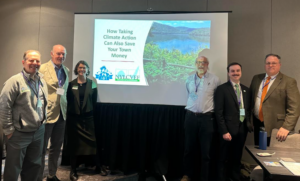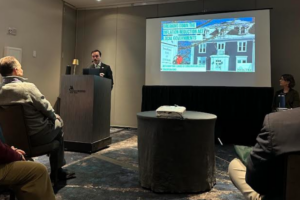NYLCVEF Talks Climate Smart Communities at New York Association of Towns Annual Meeting
February 17, 2025
On Monday, February 17, 2025, the New York League of Conservation Voters Education Fund (NYLCVEF) hosted an insightful session at the New York Association of Towns Annual Meeting & Training School. Held at the New York Marriott Marquis, the event brought together municipal leaders and climate experts from around the state to discuss how towns can take meaningful climate action while also benefiting financially.

The session, titled “How Taking Climate Action Can Also Save Your Town Money,” took place from 4:00 p.m. to 5:00 p.m. in the Alvin/Carnegie Room on the 5th floor. Moderated by Joshua Klainberg, Senior Vice President of NYLCV, the discussion focused on the Climate Smart Communities (CSC) program, a state initiative designed to support local governments in reducing greenhouse gas emissions and preparing for the impacts of climate change. Dazzle Ekblad from the Office of Climate Change at the NYS Department of Environmental Conservation explained the benefits for town participation in the CSC program. The panel featured a diverse group representing CSC certified towns: Warren Lucas, Supervisor of North Salem (Bronze); Christopher Kennan, Supervisor of North East (Bronze); Bruce Shenker, Climate Smart Communities Coordinator for New Lebanon (Silver). NYLCV Federal Policy Manager at Matt Salton rounded out the panel discussing the benefits available to towns through the federal Inflation Reduction Act.

Throughout the discussion, panelists emphasized the significant funding opportunities available to municipalities through state and federal grants, rebates, and new incentives introduced under the Inflation Reduction Act. Town leaders shared real life examples of how their communities have successfully transitioned to cleaner energy and upgraded infrastructure while taking advantage of financial programs designed to make sustainability initiatives more affordable. Supervisors from North Salem and North East highlighted their own experiences with implementing climate-smart strategies, demonstrating how these efforts not only reduce environmental impact but also lead to substantial cost savings and improved community resilience.
The session outlined practical steps for becoming certified as a Climate Smart Community, including strategies for emissions reduction and climate adaptation. Attendees left with a clearer understanding of how to access the financial tools necessary to support sustainability goals while maintaining fiscal responsibility.
Stay tuned for more updates on how local governments are leading the way in climate action.
< Back to Uncategorized









